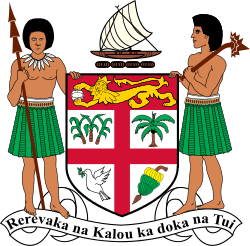Labasa (Indian Communal Constituency, Fiji)
Labasa Indian Communal is a former electoral division of Fiji, one of 19 communal constituencies reserved for Indo-Fijians. Established by the 1997 Constitution, it came into being in 1999 and was used for the parliamentary elections of 1999, 2001, and 2006. (Of the remaining 52 seats, 27 were reserved for other ethnic communities and 25, called Open Constituencies, were elected by universal suffrage). The electorate covered the Town of Labasa, the largest urban centre on the northern island of Vanua Levu.
 |
|---|
| This article is part of a series on the politics and government of Fiji |
|
Legislative
|
|
Judiciary
|
|
The 2013 Constitution promulgated by the Military-backed interim government abolished all constituencies and established a form of proportional representation, with the entire country voting as a single electorate.
Election results
In the following tables, the primary vote refers to first-preference votes cast. The final vote refers to the final tally after votes for low-polling candidates have been progressively redistributed to other candidates according to pre-arranged electoral agreements (see electoral fusion), which may be customized by the voters (see instant run-off voting).
1999
| Candidate | Political party | Votes | % |
| Muthu Swamy | Fiji Labour Party (FLP) | 4,037 | 50.07 |
| Keshwan Padayachi | National Federation Party (NFP) | 1,756 | 21.78 |
| Sanju Reddy | FGWC | 1,181 | 14.65 |
| Charan Jeath Singh | UNLP | 814 | 10.10 |
| Pradeep Singh | Independent | 237 | 2.94 |
| Vinod Prasad | Fijian Association Party (FAP) | 37 | 0.46 |
| Total | 8,062 | 100.00 | |
2001
| Candidate | Political party | Votes | % |
| James Shri Krishna | Fiji Labour Party (FLP) | 5,113 | 73.81 |
| Sushil Chand Ram | National Federation Party (NFP) | 1,333 | 19.24 |
| Edward Rajendra Nagaiya | New Labour Unity Party (NLUP) | 364 | 5.25 |
| Aleem Shah | AIM | 76 | 1.10 |
| Gaya Prasad | Soqosoqo Duavata ni Lewenivanua (SDL) | 41 | 0.59 |
| Total | 6,927 | 100.00 | |
2006
| Candidate | Political party | Votes | % |
| Kamlesh Reddy | Fiji Labour Party (FLP) | 6,813 | 84.14 |
| Jaiwant Kris Arulappan | National Federation Party (NFP) | 1,137 | 14.04 |
| Subrail Gounder | Soqosoqo Duavata ni Lewenivanua (SDL) | 147 | 1.82 |
| Total | 8,097 | 100.00 | |